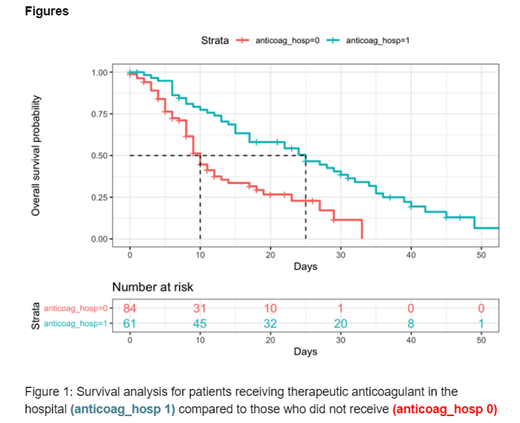Abstract
Introduction
Since March 2020, the New York City hospitals have experienced a tremendous surge of COVID-19 cases. Our hospital admitted 877 patients in a 2-week period, from March 15 to Apr 1, 2020. The exact mechanism of how COVID-19 causes vascular injury is unclear but some experts attribute it to widespread vascular inflammation[2,3]. The limited understanding of the hypercoagulable mechanism has limited our treatment techniques. To date, whether therapeutic anticoagulation is the right choice in regard to optimal management of patients with COVID-19 in suspected but not confirmed DVT (deep vein thrombosis) or PE (pulmonary embolism) is still a question[4].
Method
We performed a retrospective observational cohort analysis of 145 adult ICU patients at an acute care teaching hospital located in Queens County, New York between March 15, 2020 to April 1, 2020. The study was approved by IRB. All patients >18 years of age with confirmed SARS-CoV-2 infection and determined to require admission to intensive care units between March 15, 2020 and April 1, 2020, inclusive of those dates, were included in the investigation, with the exclusion of pregnant patients. All data was collected from the electronic health record (Allscripts) and was compiled in REDCap software for data encryption. During that study period, therapeutic anticoagulants were used in hospitalized patients with COVID-19 with high clinical risk or suspicion for venous thromboembolism (VTE). As per hospital protocol, heparin continuous infusion with a target activated partial thromboplastin time of 50 to 70 seconds or enoxaparin 1mg/kilogram(kg) twice a day for creatinine clearance (CrCl) above 30 ml/min or once a day for CrCl below 30 ml/min were used to achieve therapeutic anticoagulation. The primary outcome of the study was 28-day in-hospital mortality for critically ill patients affected by COVID-19 with or without the use of therapeutic anticoagulation. Covariates included in analysis were hypertension, diabetes, hyperlipidemia, cardiac history, and use of antiplatelet and anticoagulant medications prior to admission. Statistical analysis was done using R version 4.0.2.
Results
Out of 145 ICU patients, 61 received therapeutic anticoagulation. Kaplan-Meier survival curves show the survival probability with respect to days after admission for the two groups (those who used anticoagulant therapeutic drugs and those who didn't) using 28-day in-hospital mortality.(Fig 1) Median age for patients was 61 years for patients who didn't receive therapeutic anticoagulants compared to 60 years for patients who received therapeutic doses. The mean D-dimer among patients who received therapeutic anticoagulation was 20462 ng/ml (D-dimer units) compared to 7872 ng/ml for those who did not. The median number of days of survival for those who did not take anticoagulant therapeutic drugs is 10 days, while the median for those who did take anticoagulant therapeutic drugs is 25 days. After adjusting for hypertension, diabetes, hyperlipidemia, cardiac history, home antiplatelet medication use and continuous response for peak d-dimer levels, the results also show that there is a causal effect of 22.2 % decreased risk of 28-day in-hospital mortality if one received the therapeutic anticoagulant in the hospital.
Conclusion
Our findings suggest that there is a significantly higher median survival time in critically ill patients who received therapeutic anticoagulants in the hospital compared to those who didn't. However, our study is limited by observational nature, possible unobserved confounding, lack of metrics to classify illness severity as well as lack of evidence based decision guideline in initiation of therapeutic anticoagulation. There is an urgent need for further evidence-based studies like clinical trials which are necessary to provide specific guidelines for use of therapeutic anticoagulants in patients with COVID-19 infection.
References
1. Becker RC. COVID-19 update: Covid-19-associated coagulopathy. J Thromb Thrombolysis. 2020;50(1):54-67.
2. Tay, M.Z., Poh, C.M., Rénia, L. et al. The trinity of COVID-19: immunity, inflammation and intervention. Nat Rev Immunol 20, 363-374 (2020).
3. Lisa K. Moores, Tobias Tritschler, et al. Prevention, Diagnosis, and Treatment of VTE in Patients With Coronavirus Disease 2019: CHEST Guideline and Expert Panel Report, Chest, Volume 158, Issue 3, 2020, Pages 1143-1163, ISSN 0012-3692.
No relevant conflicts of interest to declare.


This feature is available to Subscribers Only
Sign In or Create an Account Close Modal